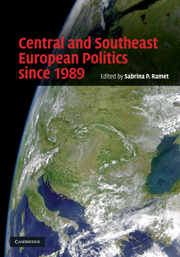Book contents
- Frontmatter
- Contents
- List of figures and maps
- List of tables
- Notes on the contributors
- Preface
- List of acronyms and abbreviations
- Guide to pronunciation of Central and Southeast European words
- 1 Central and Southeastern Europe, 1989
- 2 Central and Southeastern Europe, 2009
- Part 1 Introduction
- Part 2 Issues
- Part 3 Central Europe
- Part 4 Yugoslav Successor States
- Part 5 Southeastern Europe
- Part 6 Former Soviet republics
- 20 The Baltic states
- 21 Moldova since 1989
- Part 7 Present and future challenges
- Index
- References
21 - Moldova since 1989
Published online by Cambridge University Press: 05 June 2012
- Frontmatter
- Contents
- List of figures and maps
- List of tables
- Notes on the contributors
- Preface
- List of acronyms and abbreviations
- Guide to pronunciation of Central and Southeast European words
- 1 Central and Southeastern Europe, 1989
- 2 Central and Southeastern Europe, 2009
- Part 1 Introduction
- Part 2 Issues
- Part 3 Central Europe
- Part 4 Yugoslav Successor States
- Part 5 Southeastern Europe
- Part 6 Former Soviet republics
- 20 The Baltic states
- 21 Moldova since 1989
- Part 7 Present and future challenges
- Index
- References
Summary
As the borders of European institutions such as the EU and NATO dramatically changed during the 1990s and early 2000s, the question of identity became part of the larger debate over expansion and integration. These debates occurred not only in Brussels but also in various post-communist states in which the expression of a European identity was not necessarily a given nor embraced by all segments of society. Among central and southeastern European states, there was a general consensus among political elites and civil society regarding the economic virtues of EU membership and integration in European institutions. However, acceptance of European democratic values, including freedom of the press, religion, and assembly, has been more problematic. Moldova presents an interesting case study of the potential and the pitfalls of Europeanization and democratization for two reasons. First, Moldova contains a breakaway region not under central government authority in which communist-era symbols, institutions and leadership endure. Second, as the opening decade of the 2000s closes, Moldova is unique among central and southeastern European states in re-electing a parliament composed of a majority of communists (who subsequently elected a communist president). However, unlike the communists of old, these politicians were chosen in generally free and fair elections and, with varying degrees, advocate European integration and democracy – if not in actions, then at least in words.
- Type
- Chapter
- Information
- Central and Southeast European Politics since 1989 , pp. 473 - 492Publisher: Cambridge University PressPrint publication year: 2010
References
- 1
- Cited by



